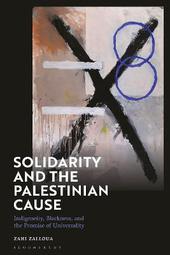
|
Solidarity and the Palestinian Cause: Indigeneity, Blackness, and the Promise of Universality
Hardback
Main Details
| Title |
Solidarity and the Palestinian Cause: Indigeneity, Blackness, and the Promise of Universality
|
| Authors and Contributors |
By (author) Zahi Zalloua
|
| Physical Properties |
| Format:Hardback | | Pages:288 | | Dimensions(mm): Height 234,Width 156 |
|
| Category/Genre | Colonialism and imperialism
Social and political philosophy |
|---|
| ISBN/Barcode |
9781350290198
|
| Classifications | Dewey:305.89274 |
|---|
| Audience | | Professional & Vocational | |
|---|
|
Publishing Details |
| Publisher |
Bloomsbury Publishing PLC
|
| Imprint |
Bloomsbury Academic
|
| Publication Date |
12 January 2023 |
| Publication Country |
United Kingdom
|
Description
Zahi Zalloua provides the first examination of Palestinian identity from the perspective of Indigeneity and Critical Black Studies. Examining the Palestinian question through the lens of settler colonialism and Indigeneity, this timely book warns against the liberal approach to Palestinian Indigeneity, which reinforces cultural domination, and urgently argues for the universal nature of the Palestinian struggle. Foregrounding Palestinian Indigeneity reframes the Palestinian-Israeli conflict as a problem of wrongful dispossession, a historical harm that continues to be inflicted on the population under the brutal Occupation of the West Bank and Gaza. At the same time, in a global context marked by liberal democratic ideology, such an approach leads either to liberal tolerance - the minority is permitted to exist so long as their culture can be contained within the majority order - or racial separatism, that is, appeals for national independence typically embodied in the two-state solution. Solidarity and the Palestinian Cause not only insists that any analysis of Indigeneity's purchase must keep this problem of translation in mind, but also that we must recast the Palestinian struggle as a universal one. As demonstrated by the Palestinian support for such movements as Black Lives Matter, and the reciprocal support Palestinians receive from BLM activists, the Palestinian cause fosters a solidarity of the excluded. This solidarity underscores the interlocking, global struggles for emancipation from racial domination and economic exploitation. Drawing on key Palestinian voices, including Edward Said and Larissa Sansour, as well as a wide range of influential philosophers such as Slavoj Zizek, Frantz Fanon and Achille Mbembe, Zalloua brings together the Palestinian question, Indigeneity and Critical Black Studies to develop a transformative, anti-racist vision of the world.
Author Biography
Zahi Zalloua is the Cushing Eells Professor of Philosophy and Literature at Whitman College, USA and Editor of The Comparatist. His recent publications include Being Posthuman: Ontologies of the Future (Bloomsbury, 2021), Zizek on Race Toward an Anti-Racist Future (Bloomsbury, 2020), Theory's Autoimmunity: Skepticism, Literature, and Philosophy (2018), and Continental Philosophy and the Palestinian Question: Beyond the Jew and the Greek (Bloomsbury, 2017).
ReviewsA brilliant and much-needed theoretical-political intervention that convincingly and creatively re-envisions the Palestinian question as one of Indigeneity, thereby not only reconceptualizing Palestinian and anti-Zionist politics, but equally offering new ways of thinking about Indigeneity. * Ilan Kapoor, Professor of Critical Development Studies, York University, Canada * In this beautiful and powerful book, Zalloua deftly untangles the terms upon which invocations of solidarity typically rest. The analysis is sharp, meticulous, and full of novel insights and unexpected turns. But even more compelling is the outcome: a renewed and rousing vision for the possibilities of solidarity beyond its own sake. * Jasbir K Puar, Professor of Women's, Gender and Sexuality Studies, Rutgers University, US * A book I am certainly going to recommend to my Postcolonial Literature class in Gaza in order to enable my students to truly appreciate the meaning of solidarity with colonized Palestinians living under a multi-tiered system of oppression, namely occupation, colonization and apartheid. It is a book that draws on the principled critical legacy of the likes of Antonio Gramsci, Frantz Fanon, and Edward Said -- the secular democratic left that cannot easily be co-opted by governments or corporations and powerful lobbies. * Haidar Eid, Associate Professor in the Department of English Literature, Al-Aqsa University, Palestine *
|